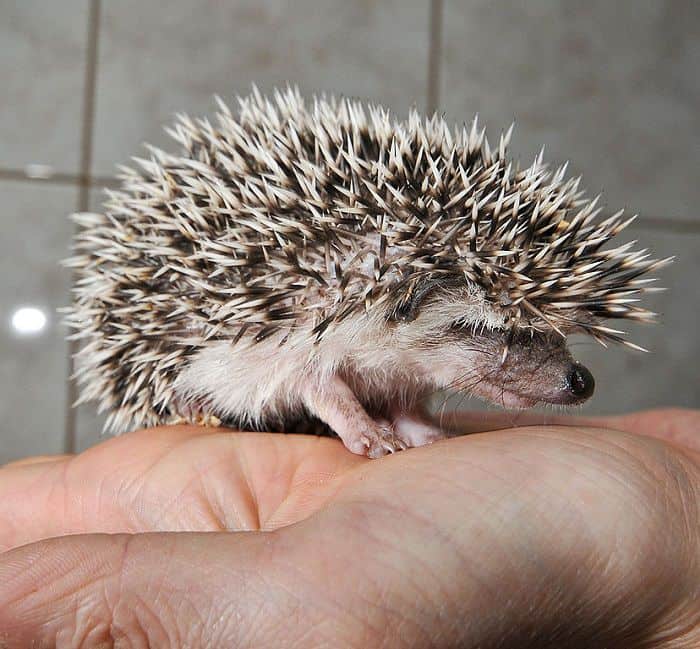Table of Contents
If you are a hedgehog owner, you already know how wonderful these creatures are and what great pets they make. These nocturnal animals have complex needs however, and any would-be owners should do their research before deciding on a hedgehog as a pet.
In the wild, hedgehogs survive on a diet of insects and spiders as well as bird eggs and some plants. In captivity though, they are often fed diets that are too high in fat, which ultimately causes problems for them.
Why is My Hedgehog Shaking?
A shaking hedgehog might be attempting to regulate its body temperature if it becomes too cold. It is important that the ambient temperature in your hedgehog’s enclosure remains somewhere between 72F and 82F or the animal may try to hibernate.
While wild hedgehogs naturally hibernate in the winter, hedgehogs in captivity generally do not; in fact, it is dangerous for captive hedgehogs to attempt hibernation. The reason for this is that they have typically not built up the necessary fat reserves that a wild hedgehog would have before hibernation.
naturally hibernate in the winter, hedgehogs in captivity generally do not; in fact, it is dangerous for captive hedgehogs to attempt hibernation. The reason for this is that they have typically not built up the necessary fat reserves that a wild hedgehog would have before hibernation.
If your hedgehog is shaking or shuddering then, it is important to check the temperature of its enclosure to see if it is warm enough. If not, raise the temperature as soon as possible. Do not use artificial heating to try to warm up your hedgehog. Instead, wrap it in a blanket until it becomes responsive.

Indian Long-Eared Hedgehog 
Four-Toed Hedgehog
Why is My Hedgehog Wobbling?
If your hedgehog does not seem cold because ambient temperatures have been within the acceptable norms, the shaking or wobbling could be a sign of a condition known as wobbly hedgehog syndrome (WHS). WHS is a progressive degenerative disease that affects around ten percent of African pygmy hedgehogs. It affects both male and female hedgehogs equally and typically appears around the age of two to three.
WHS is similar to MS in humans and the cause is unknown. The first sign of WHS in a hedgehog is a wobble as the animal tries to stand still. As the disease progresses, the hedgehog begins to lose control of its muscles. This tends to begin in the hind legs before moving to the front.
Most WHS-affected hedgehogs will die within two years. The advanced stages of WHS causes almost complete paralysis; owners are usually advised to consider vet-handled euthanasia before it gets to this stage.
My Hedgehog Can Barely Walk
As mentioned, the advanced stages of WHS cause an almost paralysis like state and leaves hedgehogs unable to walk. Nevertheless, injury can also result in hedgehogs finding it difficult to move about.
Although WHS is usually diagnosed from examination, a vet cannot confirm this diagnosis until a postmortem is done after the hedgehog dies.
If you notice that your hedgehog is having trouble moving about and it seems lethargic, it is important to contact to a vet. There are many reasons why a hedgehog may not be moving as much as normal including injury, being too cold, dehydration, an infection, or a stroke. It is important, therefore, to seek advice from a vet who can diagnose the problem and provide the necessary treatment.

Can Wobbly Hedgehog Syndrome be Cured?
WHS cannot be cured, but there are things that can be done to make your hedgehog more comfortable. If you suspect that yours might have WHS, the first thing to do is to contact an experienced exotic vet for advice.
The vet might be able to recommend diet changes, vitamin supplements, and improvements to the creature’s habitat, one or all of which could make the hedgehog more comfortable. It is important to remember that, as mentioned above, there is no treatment that helps prevent the progression of WHS, although certain vitamins such as vitamin E can mask the severity of some symptoms. Vitamin E is present in foods such as pine nuts, sunflower seeds, almonds, mangoes, and kiwis. Your vet might also recommend a vitamin E supplement.
Try to keep the hedgehog as warm as possible by providing extra bedding and blankets and making sure that there are no drafts in the room. Be sure to place food and drink within easy reach so that the animal does not have to move far to stay fed and watered.
Signs My Hedgehog is Dying
As WHS progresses to its latter stages, hedgehogs will become completely paralyzed and the animal’s quality of life will be extremely poor. It will likely struggle to eat and drink and at this stage it may be kinder to consider euthanasia. Watching your pet struggle can be awfully hard, especially when kids are involved in looking after it.
It is never easy to euthanize a beloved pet, so our advice is to talk it over with a vet. Your vet will discuss the options and the likelihood of any improvement in the affected hedgehog, although once paralysis has set in it is very unlikely symptoms will improve.
Euthanasia is not a decision to be taken lightly, but an experienced vet will be able to provide the best advice for you and the hedgehog.
Photo Credits:
- Featured Image (Long-Eared Hedgehog): I.V. Korneev, Leningrad Zoo
- Indian Long-Eared Hedgehog: Kamal Yadav
 – https://www.projectnoah.org/spottings/26706044
– https://www.projectnoah.org/spottings/26706044 - Four-Toed Hedgehog: Pueri
 Michał Klimont – CC BY-SA 3.0
Michał Klimont – CC BY-SA 3.0
- North African Hedgehog: Conselleria de Medi Ambient i Mobilitat, Govern des Illes Balears – CC BY-SA 3.0


